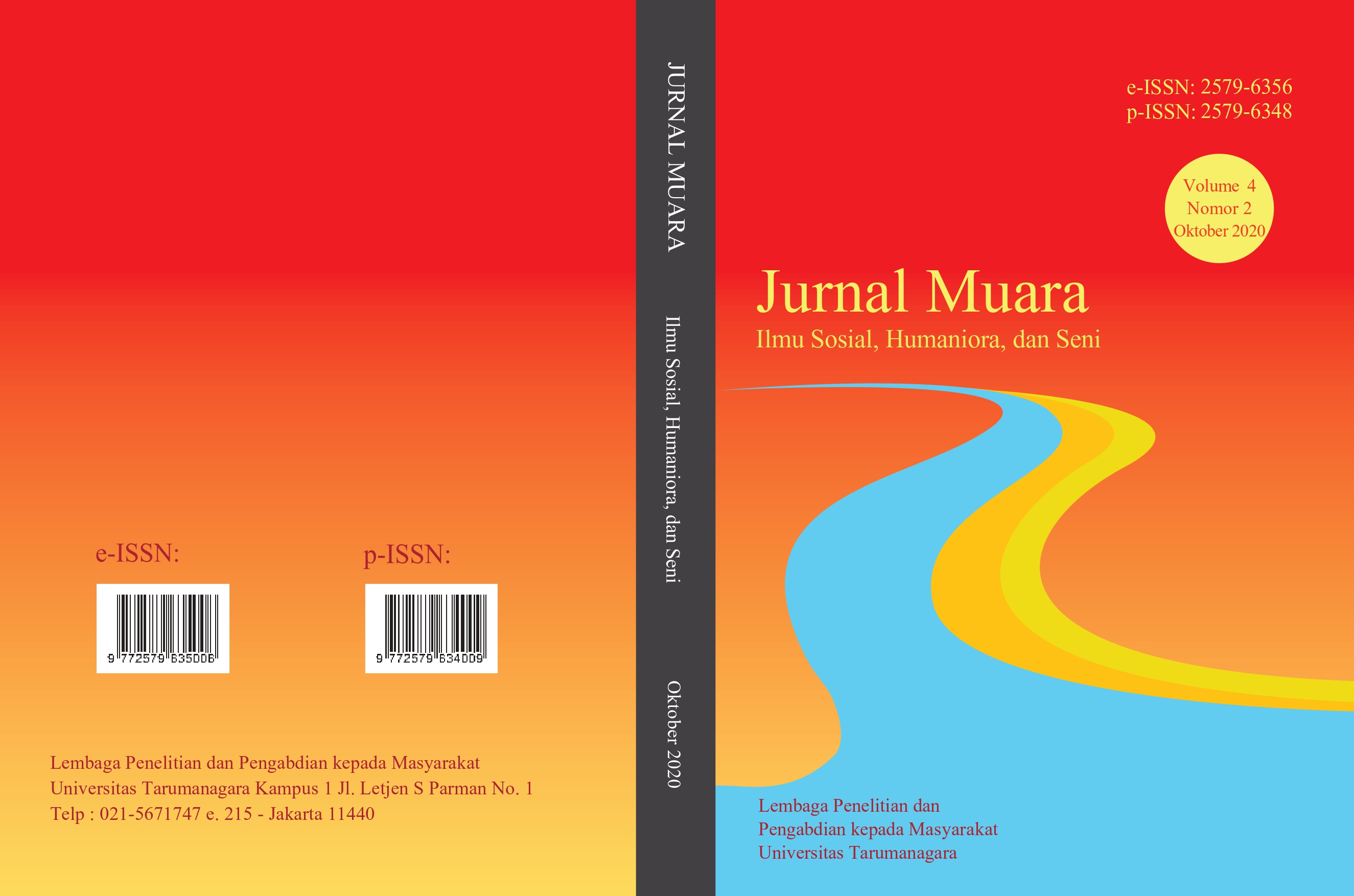PERAN SELF EFFICACY SEBAGAI MEDIATOR ANTARA JOB RESOURCES DAN WORK ENGAGEMENT PADA DOKTER HEWAN
Main Article Content
Abstract
This study explores the role of self-efficacy as a mediator between job resources and work engagement among veterinarians. Self-efficacy is seen as the degree of confidence of the veterinarian in performing their duties. Job resources is an aspect of work that individuals can use to handle the demands and challenges of their work. Job resources in this study includes opportunities for professional development and skills discretion. Opportunties for professional development refers to the opportunities provided for veterinarians to enroll in courses that can develop their veterinary knowledge. Skills discretion refers to the extent to which veterinarians acquire the opportunity to apply all their skills, both as a veterinarian and other skills such as negotiation and creativity. Participants included 32 veterinarians from X Veterinary Clinic, Jakarta. The analysis methods used were regression and bootstrapping. The results showed that self-efficacy is proven to act as a partial mediator in explaining the relationship between skills discretion and work engagement.
Penelitian ini mengeksplorasi peran self efficacy sebagai mediator antara job resources dan work engagement pada dokter hewan. Self efficacy digambarkan sebagai derajat keyakinan dokter hewan dalam melakukan pekerjaannya. Job resources merupakan aspek pekerjaan yang dapat digunakan individu untuk menangani tuntutan dan tantangan pekerjaannya. Job resources pada penelitian ini digambarkan dengan opportunities for professional development dan skills discretion. Opportunties for professional development mengacu pada kesempatan yang diberikan bagi para dokter hewan untuk mengikuti kursus yang dapat mengembangkan ilmunya sebagai dokter hewan. Skills discretion mengacu pada sejauh mana dokter hewan memeroleh kesempatan untuk menerapkan segenap keterampilan yang dimilikinya baik keterampilan sebagai dokter hewan maupun keterampilan lainnya seperti negosiasi dan berkreasi. Partisipan adalah 32 orang dokter hewan di Klinik Hewan X, Jakarta. Metode analisis yang digunakan adalah regresi dan bootstrapping. Hasil penelitian menunjukkan bahwa self efficacy teruji berperan sebagai mediator parsial dalam menjelaskan hubungan antara skills discretion dan work engagement.
Article Details
References
Bakker, A. B., Demerouti, E., & Verbeke, W. (2004). Using the job demands-resources model to predict burnout and performance. Human Resource Management, 43, 83-104. doi: 10.1002/hrm
Bakker, A. B. (2011). An evidence-based model of work engagement. Current Directions in Psychological Science, 20, 265-269. doi: 10.1177/0963721411414534
Bandura, A. (1997). The exercise of control. WH Freeman and Company.
Christian, M. S., Garza, A. S., & Slaughter, J. E. (2011). Work engagement: a quantitative review and test of its relations with task and contextual performance. Personnel Psychology, 64, 89-136.
Byrne, Z. S., Peters, J. M., & Weston, J. W. (2016). The struggle with employee engagement: measures and construct clarification using five samples. Journal of Applied Psychology, 101, 1201-1227. doi: 10.1037/apl0000124
Franedya, R. (2009, Maret 13). Penyedia aksesori dan peralatan hewan peliharaan. Kompas. http://travel.kompas.com
Lorente, L., Salanova, M., Martinez, I. M., Vera, M. (2014). How personal resources predict work engagement and self-rated performance among construction workers: A social cognitive perspective. International Journal of Psychology, 49(3), 200-207. http://repositori.uji.es/xmlui/handle/10234/134965
Mastenbroek, N. J. J. M., Jaarsma, A. D. C., Scherpbier, A. J. J. A., van Beukelen, P., Demerouti, E. (2012). The role of personal resources in explaining well-being and performance: a study among young veterinary professionals. European Journal of Work and Organizational Psychology, 1-13. doi:
1080/1359432X.2012.728040
Mastenbroek, N. J. J. M., Jaarsma, A. D. C., Demerouti, E., Muijtjens, A. M. M., Scherpbier, A. J. J. A., & van Beukelen, P. (2013a). Burnout and engagement, and its predictors in young veterinary professionals: the influence of gender. Veterinary Record. doi: 10.1136/vr.101762
Mastenbroek, N. J. J. M., Demerouti, E., van Beukelen, P., Muijtjens, A. M. M., Scherpbier, A. J. J. A., & Jaarsma, A. D. C. (2013b). Measuring potential predictors of burnout and engagement among young veterinary professionals; construction of a customised questionnaire (the Vet-DRQ). Veterinary Record. doi: 10.1136/vr.101761
Sukarelawati, E. (2017, Maret 13). Praktisi memelihara hewan mewah tren baru gaya hidup. Antaranews. http://jatim.antaranews.com
Schaufeli, W. B. & Bakker, A.B. (2004). Job demands, job resources, and their relationship with burnout and engagement: a multi-sample study. Journal of Organizational Behavior, 25, 293-315. doi: 10.1002/job.248
Schaufeli, W. B., Bakker, A. B., & Salanova, M. (2006). The measurement of work engagement with a short questionnaire: a cross-national study. Educational and Psychological Measurement, 66, 701-716. doi: 10.1177/0013164405282471
Surjanata, A., Prodjodihardjo, S., Poedjomartono, S., Sitepoe, M., Pronohartono, T., Moerad, B., Setiabudi, P., Bagja, W., Sudibyo, L.
A., Widharetna, T., Utomo, D. B., Purnomo, F. N., Pudjiono, S.,
Hartono, Ernita, R. (2010). 100 tahun dokter hewan Indonesia, sejarah, kiprah, dan tantangan. Yayasan Hemerazoa.
Viotti, S. & Converso, D. (2016). Relationship between job demands and psychological outcomes among nurses: does skill discretion matter?. International Journal of Occupational Medicine and Environmental Health, 29, 439-460. doi: 10.13075/ijomeh.1896.00520
Xanthopoulou, D., Bakker, A. B., Demerouti, E., & Schaufeli, W. B. (2007). The role of personal resources in the job demands-resources model. International Journal of Stress Management, 14, 121-141. doi: 10.1037/1072-5245.14.2.121
Xanthopoulou, D., Bakker, A. B., Demerouti, E., & Schaufeli, W. B. (2009). Reciprocal relationships between job resources, personal resources, and work engagement. Journal of Vocational Behavior, 74, 235-244. doi: 10.1016/j.jvb.2008.11.003


